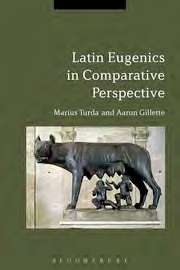Latin eugenics in comparative perspective

Editorial Bloomsbury Academic
Fecha de edición abril 2016 · Edición nº 1
Idioma inglés
EAN 9781474282758
Libro
encuadernado en tapa blanda
Resumen del libro
Latin eugenics was a scientific, cultural and political programme designed to biologically empower modern European and American nations once commonly described as 'Latin, sharing genealogical, linguistic, religious, and cultural origins. Latin Eugenics in Comparative Perspective offers a comparative, nuanced approach to eugenics as a scientific programme as well as a cultural and political phenomenon. It examines the commonalities of eugenics in 'Latin Europe and Latin America. As a program to achieve the social and political goals of modern welfare systems, Latin eugenics strongly influenced the complex relationship of the state to the individual. Drawing on a wide range of primary and secondary sources in many languages, this book offers the first history of Latin eugenics in Europe and the Americas. This is a valuable contribution to the conceptual and practical history of the international eugenics movement ... Marius Turda and Aaron Gillette should be commended for providing a rich transnational history that avoids 'glossing over' the specific national contexts, in Europe and the Americas Patrick T. Merricks, Oxford Brookes University, UK, Medical History Turda and Gillette have done an excellent job of showing just how vibrant the Latin eugenic community was. Indeed, they have written an exceptionally researched and well-documented comparative work about Latin eugenics as practised in Europe. Sarah Walsh, University of Sydney, Social History of Medicine This work systematizes some essential information on the origins of Latin eugenics during the turn of the twentieth century, helps us understand the development of the official goal of modernization in Latin American societies during the interwar period, and presents a suggestive idea for how to comprehend the persistence of eugenics and racism in Latin America after World War II. Marcos Cueto, Casa de Oswaldo Cruz, Fiocruz, Brazil, Hispanic American Historical Review This volume will transform the history of eugenics. It is the first to focus on the contested category of Latin eugenics, and as such its comparative perspective illuminates local, national
and transnational debates on what eugenics meant in several countries of Western and Eastern Europe and the Americas. By not taking Latin eugenics as read, the volume provides an exceptionally detailed and wide-ranging understanding of how this scientific-social
movement was constructed in each locale, in contrast and contradistinction to other expressions of eugenics that existed contemporaneously. Richard Cleminson, author of Catholicism, Race and Empire: Eugenics in Portugal, 1900-1950 Focusing upon a dozen different nations, spread over three continents, Turda and Gillette have produced a major trans-national and comparative study which will, no doubt, attract a wide readership and inspire further research for years to come. Maria Sophia Quine, author of Italy's Social Revolution: Charity and Welfare from Liberalism to Fascism (2002).








